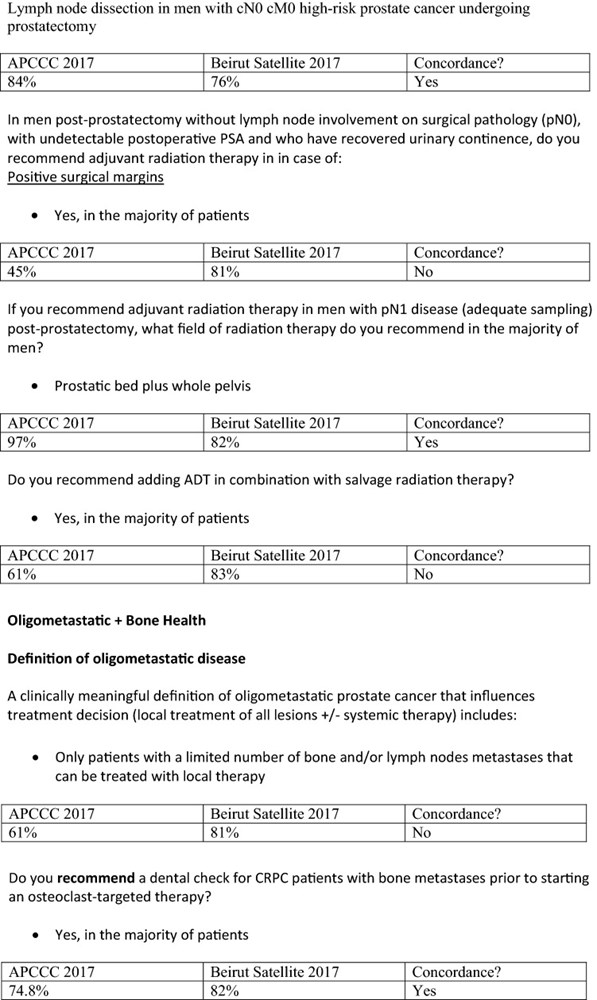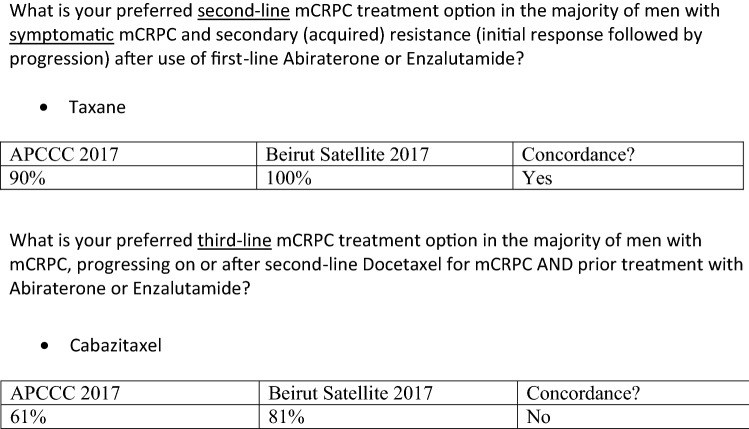Management of patients with high-risk and advanced prostate cancer in the Middle East: resource-stratified consensus recommendations
Deborah Mukherji 1, Bassem Youssef 2, Christelle Dagher 3, Albert El-Hajj 4, Rami Nasr 4, Fadi Geara 2, Danny Rabah 5, Saad Al Dousari 6, Rabih Said 7, Raja Ashou 8, Wassim Wazzan 2, Michel Jabbour 9, George Farha 10, Nibras Al Hamdani 11, Yousuf Al Hallaq 11, Hassan Ghazal 12, Haifa Dbouk 13, Bassel Bachir 2, Clement El Khoury 14, Ghazi Sakr 15, Hero K Hussain 16, Khaled Sayyid 17, Khaled Ibrahim 18, Mohammad Haidar 16, Nicolas Zouain 19, Nizar Bitar 20, Walid Alameh 21, Fadi Abbas 22, Sami Faddoul 23, Elie Nemer 24, Georges Assaf 9, Fadi Farhat 18, Muhammad Bulbul 2, Sally Temraz 3, Ali Shamseddine 3, Silke Gillessen 25 26, Aurelius Omlin 26, Raja Khauli 27
Affiliations
Affiliations
Division of Hematology/Oncology, Department of Internal Medicine, American University of Beirut Medical Center, Riad El Solh, 1107 2020, Beirut, Lebanon. Dm25@aub.edu.lb.- 2Department of Radiation Oncology, American University of Beirut Medical Center, Beirut, Lebanon.
- 3Division of Hematology/Oncology, Department of Internal Medicine, American University of Beirut Medical Center, Riad El Solh, 1107 2020, Beirut, Lebanon.
- 4Division of Urology, Department of Surgery, American University of Beirut Medical Center, Riad El Solh, 1107 2020, Beirut, Lebanon.
- 5Department of Surgery, College of Medicine, King Saud University, Riyadh, Saudi Arabia.
- 6Department of Surgery, Faculty of Medicine, Kuwait University, Kuwait City, Kuwait.
- 7Division of Hematology/Oncology, Department of Internal Medicine, Saint Georges Hospital University Medical Center, Beirut, Lebanon.
- 8Department of Radiology, Saint Georges Hospital University Medical Center, Beirut, Lebanon.
- 9Division of Urology, Department of Surgery, Saint Georges Hospital University Medical Center, Beirut, Lebanon.
- 10Department of Radiation Oncology, Mount Lebanon Hospital, Faculty of Medicine-University of Balamand, Beirut, Lebanon.
- 11Department of Surgery, Medical City Teaching Hospital Baghdad, Baghdad, Iraq.
- 12Division of Hematology/Oncology, Department of Internal Medicine, Clemenceau Medical Center, Beirut, Lebanon.
- 13Division of Oncology, Jamal Amel Hospital, Tyre, Lebanon.
- 14Department of Radiation Oncology, Hotel Dieu de France, Saint Joseph University Faculty of Medicine, Beirut, Lebanon.
- 15Division of Urology, Department of Surgery, Mount Lebanon Hospital, Beirut, Lebanon.
- 16Department of Radiology, American University of Beirut Medical Center, Beirut, Lebanon.
- 17Department of Surgery, Makassed Hospital, Beirut, Lebanon.
- 18Division of Hematology/Oncology, Department of Internal Medicine, Hammoud Hospital University Medical Center, Saida, Lebanon.
- 19Department of Radiation Oncology, Clemenceau Medical Center, Beirut, Lebanon.
- 20Division of Hematology/Oncology, Department of Internal Medicine, Sahel General Hospital, Beirut, Lebanon.
- 21Department of Surgery, Sahel General Hospital, Beirut, Lebanon.
- 22Middle East Tumor Institute, Beirut, Lebanon.
- 23Doctors Center Radiology, Beirut, Lebanon.
- 24Department of Urology, Saint Joseph University, Beirut, Lebanon.
- 25Division of Cancer Sciences, University of Manchester and the Christie, Manchester, UK.
- 26Department of Medical Oncology and Haematology, Cantonal Hospital Saint Gallen, University of Bern, Bern, Switzerland.
- 27Division of Urology, Department of Surgery, American University of Beirut Medical Center, Riad El Solh, 1107 2020, Beirut, Lebanon. rkhauli@aub.edu.lb.
Abstract
Purpose: Prostate cancer care in the Middle East is highly variable and access to specialist multidisciplinary management is limited. Academic tertiary referral centers offer cutting-edge diagnosis and treatment; however, in many parts of the region, patients are managed by non-specialists with limited resources. Due to many factors including lack of awareness and lack of prostate-specific antigen (PSA) screening, a high percentage of men present with locally advanced and metastatic prostate cancer at diagnosis. The aim of these recommendations is to assist clinicians in managing patients with different levels of access to diagnostic and treatment modalities.
Methods: The first Advanced Prostate Cancer Consensus Conference (APCCC) satellite meeting for the Middle East was held in Beirut, Lebanon, November 2017. During this meeting a consortium of urologists, medical oncologists, radiation oncologist and imaging specialists practicing in Lebanon, Syria, Iraq, Kuwait and Saudi Arabia voted on a selection of consensus questions. An additional workshop to formulate resource-stratified consensus recommendations was held in March 2019.
Results: Variations in practice based on available resources have been proposed to form resource-stratified recommendations for imaging at diagnosis, initial management of localized prostate cancer requiring therapy, treatment of castration-sensitive/naïve advanced prostate cancer and treatment of castration-resistant prostate cancer.
Conclusion: This is the first regional consensus on prostate cancer management from the Middle East. The following recommendations will be useful to urologists and oncologists practicing in all areas with limited access to specialist multi-disciplinary teams, diagnostic modalities and treatment resources.
Keywords: Consensus; Middle East; Multidisciplinary; Prostate cancer; Resource-stratified recommendations.
Conflict of interest statement
D Mukherji: research funding/honoraria from Astellas, Janssen, and Sanofi. A. Shamseddine: research funding/honoraria from Astellas, Janssen, and Sanofi. R. Khauli: research funding/honoraria from Astellas, Janssen, Hickma, and Algorithm. S. Gillessen: advisory role (including IDMCs) and Speakers Bureau: AAA International, Active Biotech, Amgen, Astellas Pharma, Bayer, Bristol-Myers Squibb, CellSearch, Clovis, CureVac, Dendreon, ESSA Pharmaceuticals, Ferring, Innocrin Pharmaceuticals, Janssen Cilag, MaxiVAX SA, Millenium, Nectar, Novartis, Orion, Pfizer, ProteoMediX, Roche, and Sanofi. Co-inventor on patent application (WO 2009138392 A1) for a method for biomarker discover (granted in China, Europe, Japan and the US). Deputy of the ESMO guidelines committee for GU cancers, member of the EAU guideline panel for prostate cancer, past chair of the EORTC GU group. Member of the STAMPEDE trial management group. All the other authors have no relevant conflicts of interest to declare.
Figures
Similar articles
Heidenreich A, Bastian PJ, Bellmunt J, Bolla M, Joniau S, van der Kwast T, Mason M, Matveev V, Wiegel T, Zattoni F, Mottet N; European Association of Urology.Eur Urol. 2014 Feb;65(2):467-79. doi: 10.1016/j.eururo.2013.11.002. Epub 2013 Nov 12.PMID: 24321502 Review.
Cornford P, Bellmunt J, Bolla M, Briers E, De Santis M, Gross T, Henry AM, Joniau S, Lam TB, Mason MD, van der Poel HG, van der Kwast TH, Rouvière O, Wiegel T, Mottet N.Eur Urol. 2017 Apr;71(4):630-642. doi: 10.1016/j.eururo.2016.08.002. Epub 2016 Aug 31.PMID: 27591931
Gillessen S, Omlin A, Attard G, de Bono JS, Efstathiou E, Fizazi K, Halabi S, Nelson PS, Sartor O, Smith MR, Soule HR, Akaza H, Beer TM, Beltran H, Chinnaiyan AM, Daugaard G, Davis ID, De Santis M, Drake CG, Eeles RA, Fanti S, Gleave ME, Heidenreich A, Hussain M, James ND, Lecouvet FE, Logothetis CJ, Mastris K, Nilsson S, Oh WK, Olmos D, Padhani AR, Parker C, Rubin MA, Schalken JA, Scher HI, Sella A, Shore ND, Small EJ, Sternberg CN, Suzuki H, Sweeney CJ, Tannock IF, Tombal B.Ann Oncol. 2015 Aug;26(8):1589-604. doi: 10.1093/annonc/mdv257. Epub 2015 Jun 3.PMID: 26041764 Free PMC article.
Chiong E, Murphy DG, Akaza H, Buchan NC, Chung BH, Kanesvaran R, Khochikar M, Letran J, Lojanapiwat B, Ng CF, Ong T, Pu YS, Saad M, Schubach K, Türkeri L, Umbas R, Le Chuyen V, Williams S, Ye DW; ANZUP Cancer Trials Group; Davis ID.BJU Int. 2019 Jan;123(1):22-34. doi: 10.1111/bju.14489. Epub 2018 Aug 19.PMID: 30019467 Review.
Management of advanced prostate cancer in Hong Kong: Insights from an APCCC-Derived survey.
Poon DM, Ma WK, Chan TW, Ho FK, Ho LY, Leung AK, Leung SY, Sze HC, Kwong PW, Chan ES.Asia Pac J Clin Oncol. 2019 Oct;15 Suppl 6:8-13. doi: 10.1111/ajco.13247. Epub 2019 Oct 23.PMID: 31642191
Cited by
Radiation therapy for prostate cancer in Syrian refugees: facing the need for change.
Eren MF, Kilic SS, Eren AA, Kaplan SO, Teke F, Kutuk T, Bicakci BC, Hathout L, Moningi S, Orio P, Atalar B, Sayan M.Front Public Health. 2023 May 31;11:1172864. doi: 10.3389/fpubh.2023.1172864. eCollection 2023.PMID: 37325331 Free PMC article.
CACYBP knockdown inhibits progression of prostate cancer via p53.
Li Q, Liu Z, Ma L, Yin W, Zhang K.J Cancer Res Clin Oncol. 2023 Aug;149(9):5761-5772. doi: 10.1007/s00432-022-04497-x. Epub 2022 Dec 28.PMID: 36576589 Free PMC article.
Bazarbashi S, Alsharm A, Meshref A, Mrabti H, Ansari J, Ghosn M, Abdulla M, Urun Y.Urol Ann. 2022 Oct-Dec;14(4):303-313. doi: 10.4103/ua.ua_148_21. Epub 2022 Jul 22.PMID: 36505997 Free PMC article. Review.
Abbasi-Kangevari M, Saeedi Moghaddam S, Ghamari SH, Azangou-Khyavy M, Malekpour MR, Rezaei N, Rezaei N, Kolahi AA; GBD 2019 NAME Prostate Cancer Collaborators; Amini E, Mokdad AH, Jamshidi H, Naghavi M, Larijani B, Farzadfar F.Front Oncol. 2022 Sep 13;12:961086. doi: 10.3389/fonc.2022.961086. eCollection 2022.PMID: 36176394 Free PMC article.
Prostate cancer in the Arab world: Bibliometric review and research priority recommendations.
Ali AH, Awada H, Nassereldine H, Zeineddine M, Sater ZA, El-Hajj A, Mukherji D.Arab J Urol. 2022 Jan 23;20(2):81-87. doi: 10.1080/2090598X.2021.2024984. eCollection 2022.PMID: 35530565 Free PMC article.
KMEL References
References
-
- Mukherji D, et al. Prostate cancer stage at diagnosis: first data from a Middle-Eastern cohort. J Clin Oncol. 2017;35(6 suppl):e552–e552. doi: 10.1200/JCO.2017.35.6_suppl.e552. - DOI
-
- James ND, et al. Addition of docetaxel, zoledronic acid, or both to first-line long-term hormone therapy in prostate cancer (STAMPEDE): survival results from an adaptive, multiarm, multistage, platform randomised controlled trial. Lancet. 2016;387(10024):1163–1177. doi: 10.1016/S0140-6736(15)01037-5. - DOI - PMC - PubMed
-
- Carrie C, et al. Salvage radiotherapy with or without short-term hormone therapy for rising prostate-specific antigen concentration after radical prostatectomy (GETUG-AFU 16): a randomised, multicentre, open-label phase 3 trial. Lancet Oncol. 2016;17(6):747–756. doi: 10.1016/S1470-2045(16)00111-X. - DOI - PubMed
-
- Fossati N et al (2017) Impact of early salvage radiation therapy in patients with persistently elevated or rising prostate-specific antigen after radical prostatectomy. Eur Urol - PubMed
-
- Perera M et al (2019) Gallium-68 prostate-specific membrane antigen positron emission tomography in advanced prostate cancer-updated diagnostic utility, sensitivity, specificity, and distribution of prostate-specific membrane antigen-avid lesions: a systematic review and meta-analysis. Eur Urol - PubMed

